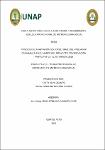| dc.contributor.advisor | Aguilera Ríos, Rosa Etelbina | |
| dc.contributor.author | Alva Ocampo, Katty | |
| dc.contributor.author | Bicerra Flores, Diana Carolina | |
| dc.date.accessioned | 2022-03-07T17:04:08Z | |
| dc.date.available | 2022-03-07T17:04:08Z | |
| dc.date.issued | 2021 | |
| dc.identifier.uri | https://hdl.handle.net/20.500.12737/7846 | |
| dc.description.abstract | The main objective of the present investigation entitled the sociocultural adaptation process of the Capanahua population of Wicungo within the framework of the participatory conservation project, Alto Tapiche 2018, had as its main objective to determine the sociocultural adaptation process of the Capanahua population of Wicungo within the framework of the participatory conservation project, Alto Tapiche 2018. It was guided by the mixed approach, descriptive type with ethnographic and simple descriptive design. The study population included the inhabitants of the Capanahua native community of Wicungo, with a total of 164 inhabitants made up of 30 families, and the sample was made up of 100% of the total population, working with heads of families, authorities, wise men and leaders. The data collection techniques were the survey, semi-structured interview and direct observation. Finally, this research concludes by detailing how the participatory conservation project was carried out or executed in the Capanahua native community of Wicungo, where the inhabitants state that they were adequately informed, they also state that at first there was no good relationship with those responsible for the project but later everything It improved, in addition, it was demonstrated that the population participated actively in this process due to the expectation that it generated for individual or collective benefit.
The villagers perceive that the project generated positive socio-cultural changes and this is evident in the results where it is shown that it helped them improve community organization, mutual support and solidarity. Likewise, they achieved a better management of their resources that does not interfere with the main traditional activities such as hunting, fishing and agriculture, which are main activities for self-consumption and to a lesser extent for commercialization. | en_US |
| dc.description.abstract | La presente investigación titulado proceso de adaptación sociocultural del poblador capanahua de Wicungo en el marco del proyecto conservación participativa, Alto Tapiche 2018, tuvo como objetivo principal determinar el proceso de adaptación sociocultural del poblador capanahua de Wicungo en el marco del proyecto conservación participativa, Alto Tapiche 2018. Se orientó por el enfoque mixto, de tipo descriptivo con diseño etnográfico y descriptivo simple. Incluyó como población de estudio a los pobladores de la comunidad nativa capanahua de Wicungo, con un total de 164 habitantes constituida por 30 familias, y la muestra estuvo conformada por el 100% de la población total, se trabajó con jefes de familia, autoridades, sabios y líderes. Tuvo como técnicas de recolección de datos la encuesta, entrevista semi estructurada y observación directa. Finalmente, esta investigación concluye detallando como se dio o ejecutó el proyecto conservación participativa en la comunidad nativa capanahua de Wicungo, donde los pobladores manifiestan que fueron informados adecuadamente, asimismo manifiestan que en un principio no hubo buena relación con los responsables del proyecto pero posteriormente todo mejoró, además, se demostró que la población participó activamente en este proceso por la expectativa que generó en beneficio individual o colectiva.
Los pobladores perciben que el proyecto generó cambios socioculturales positivos y se evidencian en los resultados donde se muestra que les ayudó a mejorar la organización comunal, el apoyo mutuo y la solidaridad. Asimismo, lograron un mejor manejo de sus recursos que no interfiere en las principales actividades tradicionales como la caza, pesca y agricultura, que son principales actividades de autoconsumo y en menor proporción para comercialización. | es_PE |
| dc.format | application/pdf | es_PE |
| dc.language.iso | spa | es_PE |
| dc.publisher | Universidad Nacional de la Amazonía Peruana | es_PE |
| dc.rights | info:eu-repo/semantics/openAccess | * |
| dc.rights.uri | https://creativecommons.org/licenses/by/4.0/ | * |
| dc.subject | Adaptación social | es_PE |
| dc.subject | Cambio sociocultural | es_PE |
| dc.subject | Programa cultural | es_PE |
| dc.subject | Poblaciones indígenas | es_PE |
| dc.title | Proceso de adaptación sociocultural del poblador capanahua en el marco del proyecto concervación participativa, Alto Tapiche 2018 | es_PE |
| dc.type | info:eu-repo/semantics/bachelorThesis | es_PE |
| thesis.degree.discipline | Antropología Social | es_PE |
| thesis.degree.grantor | Universidad Nacional de la Amazonía Peruana. Facultad de Ciencias de la Educación y Humanidades | es_PE |
| thesis.degree.name | Licenciado(a) en Antropología Social | es_PE |
| dc.subject.ocde | http://purl.org/pe-repo/ocde/ford#5.04.03 | es_PE |
| renati.author.dni | 41574708 | |
| renati.author.dni | 70369333 | |
| renati.advisor.orcid | https://orcid.org/0000-0002-9534-8979 | |
| renati.advisor.dni | 00218278 | |
| renati.type | http://purl.org/pe-repo/renati/type#tesis | es_PE |
| renati.discipline | 315056 | es_PE |
| renati.level | http://purl.org/pe-repo/renati/level#tituloProfesional | es_PE |
| renati.juror | Olórtegui Sáenz, Julio César | |
| renati.juror | Rengifo Ruiz, Roger Ernesto | |
| renati.juror | Torrejón Mori, Pedro Emilio | |
| dc.publisher.country | PE | es_PE |


